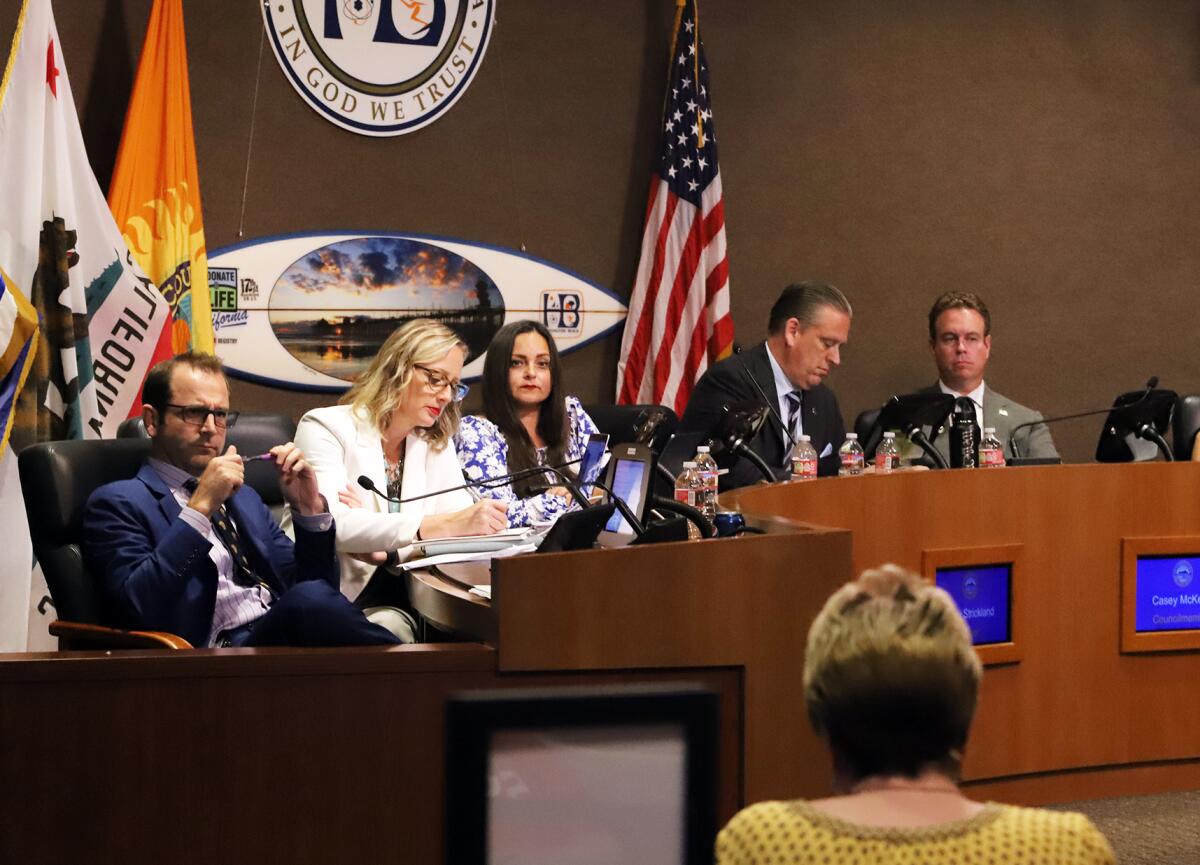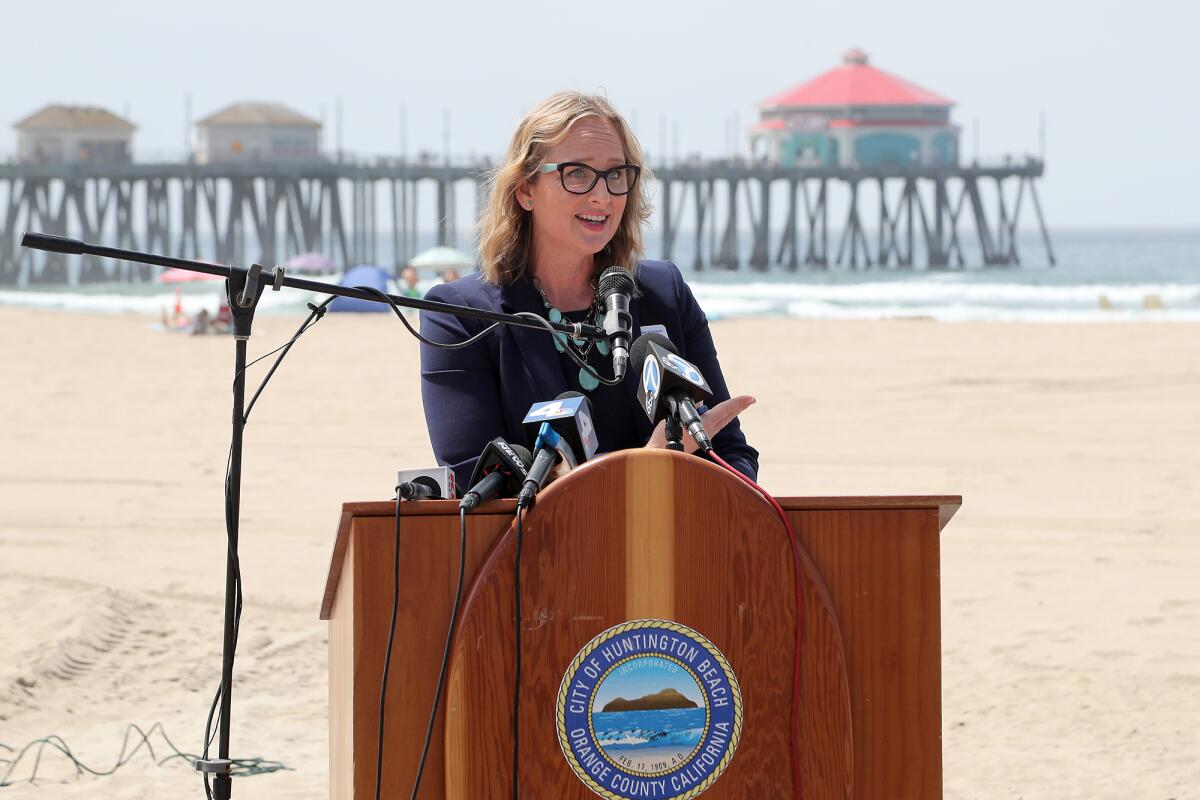H.B. City Council majority abstains on vote to explore city becoming a Certified Autism Destination

- Share via
The Huntington Beach City Council decided not to explore the feasibility of Surf City becoming a Certified Autism Destination on Tuesday night.
Afterward, Councilwoman Natalie Moser, who introduced the item, expressed her frustration with how things continue to go nearly a year into the current council regime.
Rather than voting on her item, the four conservative majority members — Mayor Tony Strickland, Mayor Pro Tem Gracey Van Der Mark and Councilmen Casey McKeon and Pat Burns — abstained from voting. That meant the item failed, despite the “yes” votes of Moser, Dan Kalmick and Rhonda Bolton.
Moser called the four abstentions “cowardly and sad” after the meeting.
“I’m asking for leadership,” she said. “It was an opportunity to be curious, not just shut something down … This [action on their part] was just partisan. It was shameful, cowardly, partisan. If one of them would have brought it forward, they would have voted it through. It wasn’t their idea, and they don’t like it that it’s us. It doesn’t matter what it is.”
Burns said in a phone interview Wednesday that abstaining was “in essence like a no vote.” He added that he couldn’t support the item.
“It’s just fiscally irresponsible,” Burns said. “The cost benefit isn’t there. Natalie, I admire her, she’s a true believer in that kind of stuff, but I don’t think she takes into account that we’re responsible for prudently spending the taxpayer’s dollars. You’re serving very few people for a lot of [resources]. A lot of money, for one thing.”
The item itself did not involve dispersing money. It requested staff to conduct a thorough review on the feasibility and requirements for Huntington Beach to become a Certified Autism Destination, engaging with stakeholders — including representatives from the disabled community.
Moser presented a chart with the perceived benefits to this, including inclusivity and accessibility, community engagement, improved services and facilities, a positive city image, networking and collaboration and economic benefits as well. She referenced her work in 2021, when she and her Public Works Commissioner Dave Gins helped secure the first Mobi-Mat installed in Huntington Beach.

“When I think about this Certified Autism Destination, I see it as a similar type of opportunity,” she said during the item’s discussion Tuesday night. “It’s an opportunity to be able to open our community and look through a different lens at the way people experience our community … Our goal should be to create a better quality of life for everyone.”
According to the Centers for Disease Control and Prevention, about 2.8% of 8-year-olds in the country have autism spectrum disorder. Some cities have taken steps to improve their accessibility.
Mesa, Ariz., became the first Autism Certified City in 2019, as designated by the International Board of Credentialing and Continuing Education Standards. Last year, Visalia in Central California became the first city to achieve the Certified Autism Destination designation.
Certified Autism Designation certification is achieved when a majority of tourism-related organizations have completed autism and sensory disorder sensitivity and awareness training, as well as completed an on-site review with IBCCES.
Moser said she had talked to since-resigned city manager Al Zelinka and Visit Huntington Beach about the benefits making the city more welcoming and accessible. When Huntington Beach unveiled its first Augmentative & Alternative Communication Board at Eader Park in September, she had further discussions with director of community and library services Ashley Wysocki.
“On our team, we do have a couple of team members who are very passionate about making our programs and services more inclusive,” Wysocki said during item discussion Tuesday night. “I think that the Certified Autism Destination is definitely a big, big dream of ours. Knowing that Visit H.B. has a similar desire to achieve this goal, there is an opportunity there to welcome in more visitors.”
But the four majority council members failed to support the exploration of the item. Burns said that an Autism Planning and Design Guidelines memo included with the item, compiled by the American Planning Assn., noted that autistic people present their symptoms differently.

“This is such a complex issue,” Burns said. “Some of this stuff is too focused just for autistic people … In reading this several times, there’s so many infrastructure nightmares and costly things to do to accommodate these things, it’s impractical.”
Burns said he’d love such efforts to happen “in a Pollyanna world,” but he added that the City Council would be “stepping way out of bounds of our ability or our government responsibility, in my mind.”
McKeon, like Burns, said the item was a noble idea but ultimately just more big government bureaucracy.
“The private sector can help, business by business on their own, without mandates,” he said. “They can encourage one another to be more welcoming.”
Moser clarified that the planning document was not meant to be a laundry list of things for Huntington Beach to implement but a good starting point.
“What can we do that can be more accommodating to persons with autism?” Bolton said. “We’re just asking the question. We’re not talking about spending any money at this point. But if we have to replace a sidewalk and we learn that having a wider sidewalk helps several different groups of people, I don’t understand what’s wrong with doing that.”
In the end, though, the votes weren’t there.
The “us versus them” mentality continues to rule on the Surf City Council, where 4-3 votes remain extremely commonplace. Moser said she hasn’t even introduced many items lately, but she felt that working on autism inclusion and accessibility could be something the council could work on together.
When reached Wednesday, Burns disputed the claim that he and his conservative colleagues not supporting the item was a partisan move.
“[The council minority] have their beliefs, we have ours,” he said. “I refuse to play politics. They can, but I’m not going to. If it’s good, I’ll do it, I don’t care who presents it. If it’s a good program, if it’s a good item, I’m for it, as long as it’s good for the people. It doesn’t need to be good for Pat, it just has to be good for the people.”
Of course, what’s good for the people seemingly depends on which council member one asks. Moser fought back tears as she described what the last year has been like, from her perspective.
“I want to do good work,” she said. “It’s devastating to me that we can’t. It’s so sad. I mean, I think that they think we are being political at all times, and I’m not. I care, and this is what I believe. Maybe that’s the same, and they just believe something else, but it doesn’t seem like that. It just makes me sad.”
All the latest on Orange County from Orange County.
Get our free TimesOC newsletter.
You may occasionally receive promotional content from the Daily Pilot.






